|
Message Board (open 24 hours!)
Twitter - @andredursin (for everything else!)
Making its eagerly anticipated 4K UHD debut from Kino Lorber this month, Philip Kaufman’s acclaimed remake of the ‘50s Don Siegel sci-fi classic INVASION OF THE BODY SNATCHERS (115 mins., 1978, PG) hasn’t aged quite as well as its predecessor, in part because of its bleak ‘70s ending – a “gotcha” moment that works best the first time around as opposed to repeat viewing. Still, while I feel there’s a tendency to over-rate Kaufman’s film, it’s nevertheless a compelling, intelligently presented version of the Jack Finney tale, with Donald Sutherland starring as a Bay Area health inspector who begins to wonder what’s going on with the body-switching paranoia overcoming the region.
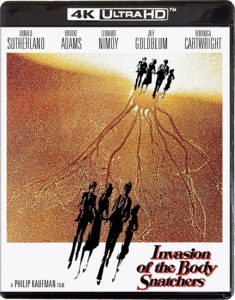 Brooke Adams co-stars and plays well off Sutherland, with an ace supporting trio of genre faves – Nimoy, Jeff Goldblum and Veronica Cartwright – making for a film that’s compelling and eerie, thanks to Kaufman and writer W.D. Richter’s often subtle touches, not to mention Michael Chapman’s cinematography and Denny Zeitlin’s excellent score. Nimoy in particular is a standout, playing a psychologist who’s one of the first to succumb to the invasion, in a character so intentionally flat it’s impossible for our protagonists to tell the difference between the real shrink and the pod version that replaces him. Brooke Adams co-stars and plays well off Sutherland, with an ace supporting trio of genre faves – Nimoy, Jeff Goldblum and Veronica Cartwright – making for a film that’s compelling and eerie, thanks to Kaufman and writer W.D. Richter’s often subtle touches, not to mention Michael Chapman’s cinematography and Denny Zeitlin’s excellent score. Nimoy in particular is a standout, playing a psychologist who’s one of the first to succumb to the invasion, in a character so intentionally flat it’s impossible for our protagonists to tell the difference between the real shrink and the pod version that replaces him.
In fact, the entire lead-up to the invasion is more interesting than what comes afterwards – the casual way the pods invade, with Kaufman and Richter conveying the shift in civilization through changes in peripheral characters and general human reactions (and eventually, the lack of them), makes the first hour of the film more compelling than the pursuit-oriented section that follows, one that culminates in an unsatisfying, nihilistic stinger than has less in common with Finney’s original story than it does the “downer” climaxes of many ’70s horror films.
Still one of the more popular sci-fi/horror films in the MGM library, this 1978 UA release has been issued by a number of different labels over the years, including MGM, Arrow overseas, and most recently, Shout Factory in 2016. Kino Lorber’s 4K UHD trumps them all thanks to a fresh scan of the Interpositive, offering Dolby Vision HDR and multiple audio options: specifically 5.1 and original theatrical 2.0 DTS MA mixes, the latter pleasingly “airy” and directional throughout. Visually, the Dolby Vision presentation is superlative on every front, and since Philip Kaufman himself was involved here in approving and color grading the HDR, it carries a great deal of legitimacy over some of these more “revisionist”/“contemporary” 4K transfers we’ve seen of certain catalog films. Since the ’78 version has never been previously presented in an immaculate form on home video, this is easily the most satisfying, visually impressive transfer yet produced, by far, with good use of HDR, evident especially in the movie’s night time sequences.
The movie is contained on a 100GB UHD disc, with Kaufman’s archival commentary and Steve Haberman’s Shout commentary both on-hand. Most of the extras, meanwhile, are offered on the Blu-Ray, which houses a 1080p presentation of the new, Kaufman-approved 4K scan – especially useful for those still waiting to upgrade to a UHD player.
Supplements are carried forth from the Shout and Arrow UK releases. These include the 2016 Shout featurettes and new interviews with Brooke Adams and co-star Art Hindle, plus W.D. Richter, Denny Zeitlin, and sound designer Ben Burtt. Richter’s conversation is arguably the most notable, with the writer discussing how the film was initially set in a small town (like Finney’s story and the Siegel film) before Kaufman opted to change it to San Francisco very late in the game. Richter also talks of Nimoy’s reclusiveness, collaboration with Sutherland and how the film’s ending – a surprise to the cast and crew – came about.
These interviews are included along with an array of trailers, TV and radio spots, with the two-disc set housed in a collectible slipcover. In all, this is a highly recommended package for one of the more interesting remakes of any sci-fi film, even with the “shocking” finale that packed an initial punch but, for me at least, leaves one disappointed Kaufman and Richter didn’t find a way to a subtler finale more in line with the tone of the rest of their adaptation.
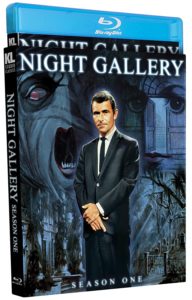 Genre fans – especially aficionados of ’70s TV – should also be very excited by the newly remastered 2K scans of NIGHT GALLERY (408 mins., 1969-71), which debuts on Blu-Ray from Kino Lorber in a three-disc Season 1 release. Genre fans – especially aficionados of ’70s TV – should also be very excited by the newly remastered 2K scans of NIGHT GALLERY (408 mins., 1969-71), which debuts on Blu-Ray from Kino Lorber in a three-disc Season 1 release.
Rod Serling, fresh off “The Twilight Zone,” hosted and contributed numerous scripts for this Universal-produced NBC anthology series, yet “Night Gallery” was far removed from Serling’s predecessor in both tone and content. Behind the scenes, Serling butted heads with producer Jack Laird, whose “quality control” was definitely not up to Serling in his heyday, resulting in a show that unquestionably was a step down from the Zone, with many episodes falling into a formulaic framework with endings telegraphed far in advance.
Most of Season 1 falls into that category, starting off with the 1969 pilot film, which includes a segment featuring Joan Crawford that was directed by a very young Steven Spielberg. Boris Sagal, Don Taylor, Jeannot Swarzc and Daryl Duke are among the other helmers of these first-season shows, which mostly aired in 1970-71 as part of NBC’s rotating “Four In One” series.
To be fair, there’s a lot of nostalgic value in these episodes for certain through their respective casts, which offer a bevy of seasoned vets (Burgess Meredith, Roddy McDowall, Agnes Moorehead, Larry Hagman) with young up-and-comers, including Diane Keaton in a brief, silly 10-minute segment that kicks off one early show. Yet there’s no denying the general repetitiveness of these episodes, as they mostly play off a theme – a usually unlikeable protagonist gets their comeuppance – and/or offers a twist you can see coming a mile in advance. Most of it, despite Serling’s involvement and on-camera hosting duties, lacks the thoughtfulness and often allegorical nature of “The Twilight Zone.”
The major exception to that – and the one episode here that ranks with some of Serling’s best work – is “They’re Tearing Down Tim Riley’s Bar.” This powerful contemporary story – fatally broken up with syndication edits for those who’ve only seen it during reruns – stars William Windom as a broken, booze-addicted salesman about to be shown the door at his job. He begins to retreat into the past as a means of breaking away from a present he doesn’t want to be a part of, not even with the affection shown by his secretary (a strong performance from Diane Baker).
Windom is fantastic in this episode – a moving and well-constructed treatise on the past, present, aging and being left behind – one that critics have often said offers Serling in a retrospective mood that’s a commentary on what was his own, declining standing in Hollywood at the time. It’s an episode that completely breaks with the formula of “Night Gallery” and would’ve been right at home in the framework of “The Twilight Zone,” which more frequently offered the kind of dramatic variety associated with this particular story.
It’s a strong enough episode to warrant recommending this Season 1 Blu-Ray by itself, even though newcomers need to be aware of the formulaic nature of the series as a whole. Certainly Kino Lorber deserves major kudos for this 2K restoration (1.33), which presents the pilot and the original, hour-long “Night Gallery” episodes in crisp, colorful transfers and healthy mono soundtracks. Extras include commentaries on every episode from the likes of Tim Lucas, Kim Newman, Constantine Nasr, Jim Benson and Scott Skelton, while historian Craig Beam contributes a commentary on “Tim Riley’s Bar” along with a featurette detailing how ruinous the syndicated versions of “Night Gallery” were to episodes that were both too short to cover a 30-minute segment – and the few that were too long, requiring disastrous edits.
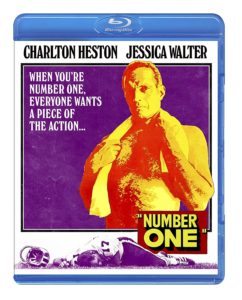 Heston Blu-Ray Debuts Heston Blu-Ray Debuts
NUMBER ONE Blu-Ray (105 mins., 1969, PG-13): Anemic late ’60s Charlton Heston vehicle – reportedly one of his least favorite films – does offer some quality NFL game footage of its era. But off the gridiron, this is an overwrought soap opera with a far-too-old Chuck starring as the fading QB of the New Orleans Saints, attempting to hang onto his job while contemplating retirement. Jessica Walter (his long suffering wife) and Diana Muldaur (a young woman of interest) are the ladies who jockey for Heston’s attention in a Tom Gries-directed film that’s nearly skeletal in its dramatic development — pokey, slow moving, depressing and unintentionally funny, complete with a “logs on the fireplace” love scene set to Dominic Frontiere’s Legrand-esque jazz score.
Coming on Blu-Ray this month in a new HD transfer licensed through MGM (1.85, DTS MA mono), “Number One” has been seldom screened (understandably so) on TV, and offers scant entertainment outside of its location shooting and game footage. There are also a couple of shots of Walter and Heston clearly “sneaking in” a scene against a full crowd that was likely there to watch a real game and wasn’t paying attention — those brief moments are amusing but the film itself is a real grind despite the uniqueness of showing how “blue collar” early stars in the NFL often were.
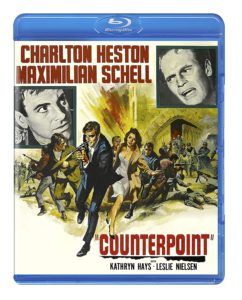 More satisfying, though hampered by a set-bound studio shoot, is Heston’s 1967 film COUNTERPOINT (107 mins., Not Rated). Here, Heston plays a tempestuous American conductor on a European tour at the end of WWII. Alas, being in the wrong place at the wrong time leads to Heston and his musicians – including ex-flame Kathryn Hays and her husband Leslie Nielsen – being captured by the Germans and imprisoned in a Belgian castle. In order to survive, Heston’s protagonist tries to find common ground with Maximilian Schell’s Nazi commandant, with a looming recital all that’s standing between the orchestra and certain death. More satisfying, though hampered by a set-bound studio shoot, is Heston’s 1967 film COUNTERPOINT (107 mins., Not Rated). Here, Heston plays a tempestuous American conductor on a European tour at the end of WWII. Alas, being in the wrong place at the wrong time leads to Heston and his musicians – including ex-flame Kathryn Hays and her husband Leslie Nielsen – being captured by the Germans and imprisoned in a Belgian castle. In order to survive, Heston’s protagonist tries to find common ground with Maximilian Schell’s Nazi commandant, with a looming recital all that’s standing between the orchestra and certain death.
Ralph Nelson (“Lilies of the Field”) helmed this Universal production which offers an interesting script by James Lee and Joel Oliansky, working from an Alan Sillitoe novel. The performances are capable but the atmosphere and overall tone are undone by a claustrophobic production that was entirely lensed at Universal Studios, giving a phony, almost TV-like look and feel to the movie – even with the widescreen treatment (2.35) it received from the great cinematographer Russell Metty. Still a reasonably entertaining film that has been rarely circulated on TV and home video throughout the years, “Counterpoint” includes a respectable Universal catalog master here with the trailer plus an engaging commentary with the reliable duo of Steve Mitchell and Steven Jay Rubin.
 Bronson, Peppard & Other ’70s Sojourns Bronson, Peppard & Other ’70s Sojourns
CHATO’S LAND Blu-Ray (100 mins., 1972, PG): A brutal (inexplicably PG rated!) “revisionist western” that marked the first of six collaborations between Charles Bronson and British director Michael Winner returns to Blu-Ray this month.
In “Chato’s Land,” Bronson plays a half-breed Apache who shoots a sadistic sheriff and then has to fend off a posse led by the likes of Jack Palance (a surprisingly understated performance), Simon Oakland, James Whitmore and Richard Basehart, who – to varying degrees of prejudice and hatred – want revenge.
Despite its conventional sounding premise, Winner and writer Gerald Wilson were far less interested in paying tribute to the western genre here than they were creating a thinly veiled commentary on Vietnam, with the posse members – who also include a young Richard Jordan – having to pursue Bronson’s nearly-mute protagonist on his terms, across his terrain, and wondering what the point of it all is. While I’ve become a fan of Bronson’s output over the years – and there’s clearly a following for “Chato’s Land” – I found the film too bitter for its own good and its agenda overly transparent.
“Chato’s Land” first made a Blu-Ray appearance through Twilight Time’s 2016 limited edition; Kino Lorber’s new release brings the movie back into circulation with an all-new 2K restoration that’s notably warmer in color tone and more pleasing than the earlier MGM catalog master (1.85, DTS MA mono). New supplements include a fresh commentary with Howard S. Berger and Steve Mitchell, plus an interview with screenwriter Gerald Wilson and the trailer.
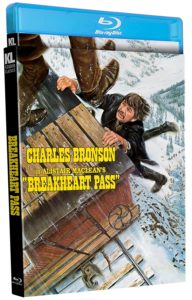 Far more entertaining is BREAKHEART PASS (95 mins., 1975, PG), an exciting, tight Alastair MacLean concoction – with the bestselling author writing the screen adaptation of his own 1974 book. Set in the Old West, “Breakheart Pass” is as much a mystery as a western as the plot unravels with a group of suspects on a snowbound train thundering through the Rockies. Among them is a suspicious wanted man (Charles Bronson) who knows more about the train’s mysterious cargo involving dozens of caskets intended for a plague-ridden fort…except the caskets are filled with guns and explosives, and the Governor (Richard Crenna) clearly isn’t on the level – nor are most of the passengers on this ill-fated trip. Far more entertaining is BREAKHEART PASS (95 mins., 1975, PG), an exciting, tight Alastair MacLean concoction – with the bestselling author writing the screen adaptation of his own 1974 book. Set in the Old West, “Breakheart Pass” is as much a mystery as a western as the plot unravels with a group of suspects on a snowbound train thundering through the Rockies. Among them is a suspicious wanted man (Charles Bronson) who knows more about the train’s mysterious cargo involving dozens of caskets intended for a plague-ridden fort…except the caskets are filled with guns and explosives, and the Governor (Richard Crenna) clearly isn’t on the level – nor are most of the passengers on this ill-fated trip.
At just over 90 minutes “Breakheart Pass” is a fast-moving, confident picture that hits the right note right off the bat courtesy of Jerry Goldsmith’s superb score and never lets up. The action, which comes in quick spurts, is crisply choreographed, Lucien Ballard’s cinematography effectively captures the wintry Idaho locations, and the performances – from an engaged Bronson to Jill Ireland (of course) and character actors like Charles Durning, Ed Lauter and David Huddleston – are just right. There are no extraneous characters or detours – director Tom Gries sticks to the central narrative and the result is clearly one of Bronson’s best movies from the era.
Kino Lorber previously released a Blu-Ray of the film back in 2014 but this new release offers a much improved 2K scan (1.85, DTS MA mono) with fresher detail and warmer colors. A highly enjoyable commentary with Nathaniel Thompson, Steve Mitchell and Howard S. Berger also debuts on the set, with the trio praising Goldsmith’s score and discussing the film’s initially disappointing box-office returns. The trailer is also on-hand.
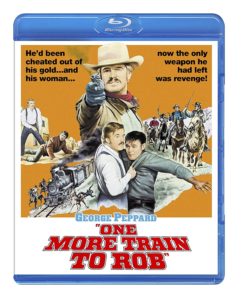 An earlier ’70s western with more of a lighter touch is ONE MORE TRAIN TO ROB (106 mins., 1971, GP), a George Peppard vehicle with the star playing a con artist who gets out of prison and heads out to settle his grievances against the ex-partners (Diana Muldaur, John Vernon) who held onto his share of a train robbery from a couple of years prior. Genre vet Andrew McLaglen helmed this colorfully played though not always tonally consistent film that tries to step outside its lane – so to speak – as other genre efforts from its time did. Code Red’s Blu-Ray (1.85, DTS MA mono) is derived from a perfectly acceptable Universal catalog master and includes the trailer. An earlier ’70s western with more of a lighter touch is ONE MORE TRAIN TO ROB (106 mins., 1971, GP), a George Peppard vehicle with the star playing a con artist who gets out of prison and heads out to settle his grievances against the ex-partners (Diana Muldaur, John Vernon) who held onto his share of a train robbery from a couple of years prior. Genre vet Andrew McLaglen helmed this colorfully played though not always tonally consistent film that tries to step outside its lane – so to speak – as other genre efforts from its time did. Code Red’s Blu-Ray (1.85, DTS MA mono) is derived from a perfectly acceptable Universal catalog master and includes the trailer.
After the success of “Rocky,” the lead talents in front of and behind the camera went off to film a disparate group of unsuccessful projects. For Sylvester Stallone, it meant heading to Universal for the ’40s wrestling drama “Paradise Alley.” His leading lady, Talia Shire, stuck around United Artists for the busted psycho-thriller “Windows.” And director John G. Avildsen also helmed an “intimate” movie for UA, this one pairing the odd coupling of Paul Sorvino and dancer Anne Ditchburn in SLOW DANCING IN THE BIG CITY (110 mins., 1978, PG).
This overheated romance stars Sorvino as a NY Daily News columnist who falls for his beautiful, ballet-dancing next door neighbor (Ditchburn), only to find out she has an incurable “disease of the week” you’d routinely find in movies throughout the 1970s. Barra Grant’s script is awash in cliches and culminates in a “you have to see it” climax Leonard Maltin described as “so shameless” that it “would fry your brain with its bathos” – but at least Bill Conti’s score is pleasant enough and takes center stage when the movie kicks into a melodramatic realm that you either go along with or not. That said, if you aren’t a hopeless movie romantic, “Slow Dancing…” requires too many suspensions of disbelief to work.
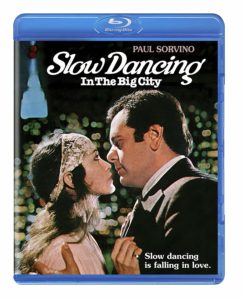 Conti provides a seven-minute, diplomatic overview of his work on the film in Scorpion’s Blu-Ray premiere of this little-seen late ’70s drama, which Avildsen decided to make shortly after being fired from the John Travolta smash “Saturday Night Fever” (talk about a comedown!). The 2K scan (1.78) and mono sound are both top-notch, with Scorpion and Kino Lorber also offering a even briefer interview with co-star Nicolas Coster. Conti provides a seven-minute, diplomatic overview of his work on the film in Scorpion’s Blu-Ray premiere of this little-seen late ’70s drama, which Avildsen decided to make shortly after being fired from the John Travolta smash “Saturday Night Fever” (talk about a comedown!). The 2K scan (1.78) and mono sound are both top-notch, with Scorpion and Kino Lorber also offering a even briefer interview with co-star Nicolas Coster.
After “National Lampoon’s Animal House” hit it big, producer Matty Simmons and various studios looked to keep the brand alive on the big-screen. Yet there were several failed projects before Chevy Chase suited up as the head of the Griswold clan in the “Vacation” movies, including an aborted spoof named “Jaws 3, People 0” and the dismal “National Lampoon’s Class Reunion.”
In between came NATIONAL LAMPOON’S MOVIE MADNESS (89 mins., 1981, R), a film originally titled “National Lampoon Goes to the Movies” and still referred to that way in clumsy opening credits (that feature both titles!) and Dr. John’s theme song. Ultimately, the name wouldn’t have mattered since UA test screened the comic anthology to reportedly disastrous results in 1981 (allegedly nearby our Rhode Island offices), leading to the excision of an entire segment that poked fun at disaster movies.
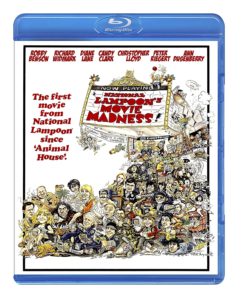 The segments that remain still carry some curiosity value due to their stars – “Animal House” almunus Peter Riegert fares best (relatively speaking) in the opening segment as a me-generation yuppie who wants to “grow” beyond the confines of his suburban family. This is a lightly amusing slice of comedic irony from director Bob Giraldi that co-stars Candy Clark, Diane Lane and a topless Teresa Ganzel, and is by far the most palatable of the segments. “Jaws 2” ingenue Ann Dusenberry subsequently tries hard to sell her rags-to-riches story of a stripper who becomes the head of Robert Culp’s margarine empire in a piece that overstays its welcome – yet even that is more amusing than director Henry Jaglom’s strained satire of police procedurals that closes the picture, featuring Richard Widmark and Robby Benson as cops hunting after Christopher Lloyd’s serial killer. The segments that remain still carry some curiosity value due to their stars – “Animal House” almunus Peter Riegert fares best (relatively speaking) in the opening segment as a me-generation yuppie who wants to “grow” beyond the confines of his suburban family. This is a lightly amusing slice of comedic irony from director Bob Giraldi that co-stars Candy Clark, Diane Lane and a topless Teresa Ganzel, and is by far the most palatable of the segments. “Jaws 2” ingenue Ann Dusenberry subsequently tries hard to sell her rags-to-riches story of a stripper who becomes the head of Robert Culp’s margarine empire in a piece that overstays its welcome – yet even that is more amusing than director Henry Jaglom’s strained satire of police procedurals that closes the picture, featuring Richard Widmark and Robby Benson as cops hunting after Christopher Lloyd’s serial killer.
What’s especially odd about “Movie Madness” are the satirical targets – including “The Greek Tycoon” and “Kramer Vs. Kramer,” which by the early ’80s meant the movie’s comedy was anything but fresh. Loads of familiar faces make the film watchable now, whether it’s appearances by a young Rhea Pearlman, Julie Kavner or Olympic Dukakis, but it’s obvious that UA knew it had a flop on its hands from the fact they sat on it for over a year before eventually releasing the pared-down final cut to a disinterested public. Code Red and Kino Lorber’s Blu-Ray debuts the film in high-def in a fine if seemingly overmatted MGM master (1.85) with DTS MA mono sound.
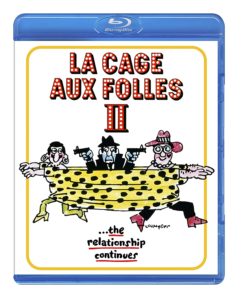 Also new from Code Red this month is LA CAGE AUX FOLLES II (102 mins., 1981, R), the French sequel to the international comedy smash of the late ’70s. This sequel – following Renato and Albin’s adventures as they flee to a farm after getting unwittingly wrapped up in espionage – was not nearly as well-received by critics, but still managed to make money in France and on the art-house circuit internationally. Edouard Molinaro returned to helm a script by Francis Veber with Ennio Morricone scoring, and Code Red’s Blu-Ray (1.85) offers the trailer plus either French audio (subtitled) or the American theatrical dub. Also new from Code Red this month is LA CAGE AUX FOLLES II (102 mins., 1981, R), the French sequel to the international comedy smash of the late ’70s. This sequel – following Renato and Albin’s adventures as they flee to a farm after getting unwittingly wrapped up in espionage – was not nearly as well-received by critics, but still managed to make money in France and on the art-house circuit internationally. Edouard Molinaro returned to helm a script by Francis Veber with Ennio Morricone scoring, and Code Red’s Blu-Ray (1.85) offers the trailer plus either French audio (subtitled) or the American theatrical dub.
FREUD Blu-Ray (140 mins., 1962; Not Rated): Montgomery Clift stars as a young Sigmund Freud in this John Huston-directed biopic of the neurologist and his early years in Vienna, promoting his then-controversial psychiatric theories and treatments. Douglas Slocombe’s B&W cinematography and Jerry Goldsmith’s score (some of which will sound familiar to “Alien” fans!) are the major artistic contributions to this at times heavy-handed drama, scripted by Charles Kaufman and producer Wolfgang Reinhardt. Kino Lorber’s Blu-Ray (1.85) premieres a fine new 2K master (1.85) with an astute commentary from Tim Lucas, the trailer, and a “Trailers From Hell” segment with Howard Rodman.
JET PILOT Blu-Ray (113 mins., 1957; Not Rated): Filmed in the late ’40s, reshot in the early ’50s and reworked by a reported handful of directors, the mystery surrounding Howard Hughes’ “Jet Pilot” is more interesting than the rather hum-drum John Wayne vehicle that ended up on-screen. Wayne plays a Air Force colonel trying to extract information from a Russian pilot (Janet Leigh); they eventually marry and head to Russia, posing as defectors, before they have to turnaround and leave in a movie reportedly filmed between 1949-53, with the finished product debuting in 1957 to mostly mixed/negative reviews. Kino Lorber’s Blu-Ray offers both 1.37 and 1.85 aspect ratios for the movie along with a trailer, but it’s unfortunate there’s no commentary on-hand to detail the movie’s bizarre production history.
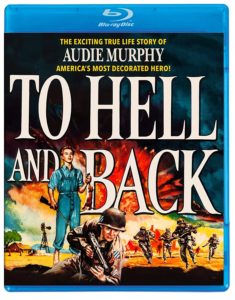 TO HELL AND BACK Blu-Ray (106 mins., 1955; Not Rated): The most decorated soldier of WWII, Audie Murphy, stars as himself in this exciting Universal adaptation of Murphy’s own autobiography, profiling his accomplishments on the battlefield and life away from it. Crisply shot in scope, “To Hell and Back” plays conventionally in cinematic terms but remains highly worthwhile when you consider how much of the material was fact-based. In addition to Kino Lorber’s superb 1080p (2.35) Universal master, the disc includes a trailer and a commentary from the always insightful duo of Steve Mitchell and Steven Jay Rubin. TO HELL AND BACK Blu-Ray (106 mins., 1955; Not Rated): The most decorated soldier of WWII, Audie Murphy, stars as himself in this exciting Universal adaptation of Murphy’s own autobiography, profiling his accomplishments on the battlefield and life away from it. Crisply shot in scope, “To Hell and Back” plays conventionally in cinematic terms but remains highly worthwhile when you consider how much of the material was fact-based. In addition to Kino Lorber’s superb 1080p (2.35) Universal master, the disc includes a trailer and a commentary from the always insightful duo of Steve Mitchell and Steven Jay Rubin.
Treasures from the Universal Vaults: Fans of vintage Universal productions of the ’30s and ’40s have much to look forward to this month from Kino Lorber, including a full quartet of titles brand new to Blu-Ray. As is usual with the Universal films from the era, even the “minor” offerings aren’t bereft of interest or entertainment.
That’s the case certainly with THE SECRET OF THE BLUE ROOM (66 mins., 1933), an early talkie that finds Gloria Stuart as a heiress whose three suitors agree to spend a night in a room of her father’s estate where a trio of people had been killed. Numerous Universal players pop up here – Lionel Atwill and Onslow Stevens among them – and Kurt Neumann’s pre-Code feature is atmospheric enough, even if it’s much more a mystery than a typical genre exercise from the studio. Kino Lorber’s B&W (1.37, 20 DTS MA mono) transfer is perfectly fine given the age of the elements and a commentary from Michael Schlesinger talks about where the Carl Laemmle presentation fits within the larger Universal filmography of the 1930s…More pre-Code entertainment can be found in BROKEN LULLABY (77 mins., 1932), one of Ernst Lubitsch’s early works, a potent drama following Philips Holmes as a French violinist and WWI vet who feels guilt having killed a German soldier during the war. He heads to Germany and meets the dead soldier’s family, including his still-grieving father (Lionel Barrymore) and fiancee (Nancy Carroll), while pretending to be a friend of the man who perished at his hands. Joseph McBride’s commentary is new to Kino Lorber’s Blu-Ray, which includes a finely detailed 2K master (1.37 B&W) from the Universal vaults (available 12/7).
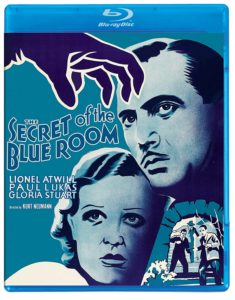 A reportedly sizable budget backed THE MYSTERY OF EDWIN DROOD (87 mins., 1935), an adaptation of Charles Dickens’ unfinished novel from director Stuart Walker starring Claude Rains as a drug-addled choirmaster competing for the hand of a pretty student (Heather Angel) along with his nephew, Edwin Drood (David Manners from the Bela Lugosi “Dracula”). “Dracula”’s John L. Balderston and Gladys Unger came up with their own solution to Dickens’ story and the film – while a box-office disappointment at the time of its release – is very watchable, especially for Universal fans with “Bride of Frankenstein” alumnus Valerie Hobson and E.E. Clive appearing in support. Historian David Del Valle provides an enlightening commentary in Kino Lorber’s Blu-Ray (1.37 AVC, 2.0 DTS MA mono). A reportedly sizable budget backed THE MYSTERY OF EDWIN DROOD (87 mins., 1935), an adaptation of Charles Dickens’ unfinished novel from director Stuart Walker starring Claude Rains as a drug-addled choirmaster competing for the hand of a pretty student (Heather Angel) along with his nephew, Edwin Drood (David Manners from the Bela Lugosi “Dracula”). “Dracula”’s John L. Balderston and Gladys Unger came up with their own solution to Dickens’ story and the film – while a box-office disappointment at the time of its release – is very watchable, especially for Universal fans with “Bride of Frankenstein” alumnus Valerie Hobson and E.E. Clive appearing in support. Historian David Del Valle provides an enlightening commentary in Kino Lorber’s Blu-Ray (1.37 AVC, 2.0 DTS MA mono).
Though not a Universal release, the 1940 Paramount production THE MAD DOCTOR (90 mins.) fits comfortably alongside Kino Lorber’s other mystery-suspense thrillers this month. Basil Rathbone takes time out from essaying Sherlock Holmes here to play Dr. George Sebastien, a physician who woos and murders wealthy women for their fortunes. “Notorious” cinematographer Ted Tetzlaff stages an appropriately shadowy environment for this dramatic piece that functions best as a vehicle for Rathbone and his fans. Kino Lorber’s Blu-Ray (1.37 AVC, 2.0 DTS MA) again sports a fine Universal-licensed B&W transfer with the trailer and another commentary by David Del Valle.
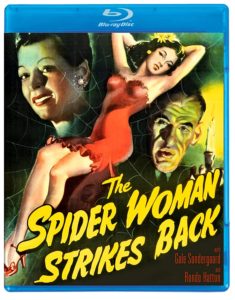 Rathbone’s co-star in 1942’s “The Spider Woman” – regarded as one of the better late entries in the star’s Sherlock Holmes series – was Gale Sondergaard, whose popularity lead to the one-time spin-off feature THE SPIDER WOMAN STRIKES BACK (59 mins., 1946). Alas, despite Sondergaard’s return to her role of the arch-villainness, this is a slender and disappointing outing co-starring Rondo Hatton as the Spider Woman’s henchman and former Nancy Drew Brenda Joyce as her caretaker, who’s all that’s standing between the Spider Woman releasing a death serum on the world. Kino Lorber’s Blu-Ray (1.37 B&W, DTS MA 2.0 mono) offers a number of superb new extras, including a commentary from Universal experts Tom Weaver and David Schecter; a new documentary on the making of the picture with C. Courtney Joyner, Rick Baker and Fred Olen Ray among others; and the original trailer. Rathbone’s co-star in 1942’s “The Spider Woman” – regarded as one of the better late entries in the star’s Sherlock Holmes series – was Gale Sondergaard, whose popularity lead to the one-time spin-off feature THE SPIDER WOMAN STRIKES BACK (59 mins., 1946). Alas, despite Sondergaard’s return to her role of the arch-villainness, this is a slender and disappointing outing co-starring Rondo Hatton as the Spider Woman’s henchman and former Nancy Drew Brenda Joyce as her caretaker, who’s all that’s standing between the Spider Woman releasing a death serum on the world. Kino Lorber’s Blu-Ray (1.37 B&W, DTS MA 2.0 mono) offers a number of superb new extras, including a commentary from Universal experts Tom Weaver and David Schecter; a new documentary on the making of the picture with C. Courtney Joyner, Rick Baker and Fred Olen Ray among others; and the original trailer.
AMONG THE LIVING (69 mins., 1941) finds Albert Dekker in a dual role of a psycho killer who escapes from prison on the night of his father’s funeral and the twin brother who’s out to stop him. Susan Hayward co-stars in a Paramount release heavy on southern gothic atmosphere, with director Stuart Heisler favoring more of a noir mood than outright horror. Jason Ney provides a commentary on Kino Lorber’s Blu-Ray (1.37 B&W)…Production values are high in THE ACCUSED (101 mins., 1949), a B&W drama starring Loretta Young as a college professor who’s attacked and nearly raped by a student driving her home. After she kills the boy in self-defense, she gets wrapped up in a murder investigation as well as a relationship with the young man’s guardian (Robert Cummings). William Dieterle helmed this Hal Wallis production, superbly acted with a fine Victor Young score. Kino Lorber’s Blu-Ray (1.37 B&W) includes a new commentary featuring historian Eddy Von Mueller and the trailer.
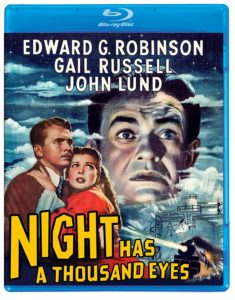 Edward G. Robinson plays a vaudeville mentalist who actually has the power to see the future, and after retreating from public view, returns to help an heiress (Gail Russell) and her fiance (John Lund) in NIGHT HAS A THOUSAND EYES (81 mins., 1948), a low-key but effective Universal thriller scripted by Barre Lyndon and Jonathan Latimer from a Cornell Woolrich novel. Another striking 2K master (1.37 B&W) marks Kino Lorber’s Blu-Ray along with a commentary from Imogen Sara Smith and the trailer…Robert Siodmak helmed DEPORTED (89 mins., 1950), heading to Italy for this thinly-veiled variation on the story of Lucky Luciano. Jeff Chandler plays an American “undesirable” sent back to Italy where he gets wrapped up with a widow (Marta Toren) and a black market ring. Eddy Von Mueller’s commentary lends insight into this later-Hollywood effort from Siodmak, one that’s been notoriously difficult for movie buffs to find over the years (1.37 B&W). Edward G. Robinson plays a vaudeville mentalist who actually has the power to see the future, and after retreating from public view, returns to help an heiress (Gail Russell) and her fiance (John Lund) in NIGHT HAS A THOUSAND EYES (81 mins., 1948), a low-key but effective Universal thriller scripted by Barre Lyndon and Jonathan Latimer from a Cornell Woolrich novel. Another striking 2K master (1.37 B&W) marks Kino Lorber’s Blu-Ray along with a commentary from Imogen Sara Smith and the trailer…Robert Siodmak helmed DEPORTED (89 mins., 1950), heading to Italy for this thinly-veiled variation on the story of Lucky Luciano. Jeff Chandler plays an American “undesirable” sent back to Italy where he gets wrapped up with a widow (Marta Toren) and a black market ring. Eddy Von Mueller’s commentary lends insight into this later-Hollywood effort from Siodmak, one that’s been notoriously difficult for movie buffs to find over the years (1.37 B&W).
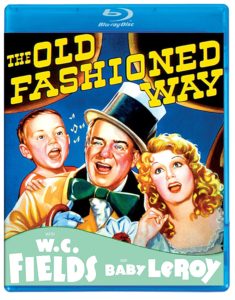 W.C. Fields Comedies: A trio of vintage W.C. Fields comedies are also new to high definition this month from Kino Lorber, all licensed through Universal. W.C. Fields Comedies: A trio of vintage W.C. Fields comedies are also new to high definition this month from Kino Lorber, all licensed through Universal.
During the 1930s, Fields found a comedic accomplice in Baby LeRoy in a pair of Paramount pictures: THE OLD FASHIONED WAY (71 mins., 1934), wherein Fields’ “Great McGonigle” persuades the mother of an obnoxious child (LeRoy) that she’ll have a role in his play “The Drunkard,” all the better to sell tickets for his struggling theater troupe’s latest production. This highly-regarded Fields comedy lead to the immediate reunion of Fields and Baby LeRoy in IT’S A GIFT (68 mins., 1934), a more physical comedy that finds Fields – with family in-tow – moving to the greener pastures of California after buying an orange ranch from his uncle’s inheritance. Hilarity ensues with both movies on Blu-Ray including 1080p (1.37) B&W transfers, trailers, and commentaries from Fields historian James L. Neibaur.
One of Fields’ very best, THE BANK DICK (72 mins., 1940), completes the trio: a robust farce that clicks on all levels, starring Fields as a hapless drunk who improbably becomes a security guard after accidentally stopping a bank robber in action. Shenanigans ensue in a variety of predicaments that enable Fields (who also wrote under the pseudonym Mahatma Kane Jeeves) and frequent collaborater Edward Cline to stage some at-times uproarious gags that most critics rank as his defining screen comedy. Kino Lorber’s 1080p (1.37) B&W transfer is crisp and filled with natural grain, with supplements including the trailer and a new commentary by Michael Schlesinger.
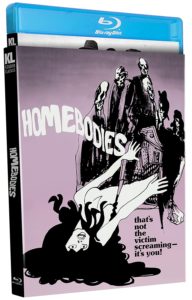 HOMEBODIES Blu-Ray (96 mins., 1974, PG): A dark comedy with horror overtones, director/co-writer Larry Yost’s “Homebodies” takes its six senior-citizen leads seriously – when a developer decides to tear down their old brownstone, the group turn the tables and become increasingly violent as they try to stop the plan by any means necessary. This is an uneven little oddball of a movie with some good performances (mostly by character actors like Peter Brocco, Frances Fuller and Ian Wolfe) and Cincinnati-based location shooting. After having not been widely circulated for some time, Kino Lorber utilized a Studio Canal restoration (1.85, 2.0 DTS MA) for their Blu-Ray and the package is enhanced with commentary from Yost, an interview with producer Marshal Backlar, a TV spot, and the original trailer. HOMEBODIES Blu-Ray (96 mins., 1974, PG): A dark comedy with horror overtones, director/co-writer Larry Yost’s “Homebodies” takes its six senior-citizen leads seriously – when a developer decides to tear down their old brownstone, the group turn the tables and become increasingly violent as they try to stop the plan by any means necessary. This is an uneven little oddball of a movie with some good performances (mostly by character actors like Peter Brocco, Frances Fuller and Ian Wolfe) and Cincinnati-based location shooting. After having not been widely circulated for some time, Kino Lorber utilized a Studio Canal restoration (1.85, 2.0 DTS MA) for their Blu-Ray and the package is enhanced with commentary from Yost, an interview with producer Marshal Backlar, a TV spot, and the original trailer.
FILIBUS: THE MYSTERIOUS AIR PIRATE Blu-Ray (71 mins., 1915; Milestone/Kino Lorber): Ahead-of-its-time Italian silent charts the adventures of Filibus, a “sky pirate” who acts like a futuristic Robin Hood, stealing from the rich and flying away into the clouds above. Five short films, an Italian supporting feature “Signori Girati,” and two additional scores for the movie from Donald Sosin are on-hand in this Milestone restoration now available on Blu-Ray…Also new from Milestone is the highly acclaimed documentary SAY AMEN, SOMEBODY (100 mins., 1982), George T. Nierenberg’s look at Gospel music and a number of its legendary interpreters, including Thomas A. Dorsey, Mother Willie Mae Ford Smith, the Barrett Sisters, and Zella Jackson Price among others. This is a sterling 4K restoration of a movie that was championed on Siskel & Ebert’s show back in the ’80s and received further, widespread critical kudos; this gorgeous new release is full of extras including commentary and rehearsal footage of the Barrett Sisters, 5.1/2.0 stereo sound and a 1080p AVC encoded transfer.
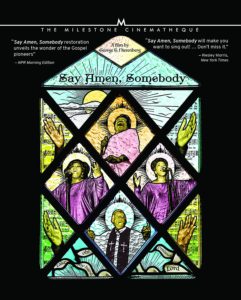 Bill Morrison’s newest film excursion, THE VILLAGE DETECTIVE: A SONG CYCLE (81 mins., 2021), is a fascinating piece that springboards off a Icelandic fishing vessel’s capture of several 35mm film reels back in 2016. While the footage wasn’t a long-lost piece of Soviet cinema but rather a popular native comedy from 1969, Morrison uses this event to make a meditation on cinema’s past and Russian film history, underscored by David Lang in a dreamy state. Additional shorts from Morrison are included here along with a 1080p (1.78) Blu-Ray transfer, 5.1/2.0 sound options and trailers. Bill Morrison’s newest film excursion, THE VILLAGE DETECTIVE: A SONG CYCLE (81 mins., 2021), is a fascinating piece that springboards off a Icelandic fishing vessel’s capture of several 35mm film reels back in 2016. While the footage wasn’t a long-lost piece of Soviet cinema but rather a popular native comedy from 1969, Morrison uses this event to make a meditation on cinema’s past and Russian film history, underscored by David Lang in a dreamy state. Additional shorts from Morrison are included here along with a 1080p (1.78) Blu-Ray transfer, 5.1/2.0 sound options and trailers.
New on DVD: New documentary releases this month include Connie Hochman’s IN BALANCHINE’S CLASSROOM (88 mins.), a look at the heyday of director George Balanchine’s New York City Ballet, with never-before-seen archival footage and copious interviews making for a must for ballet lovers (16:9, 5.1/2.0, with additional scenes and trailers); IT’S A WONDERFUL LIFE: THE REAL BEDFORD FALLS (30 mins., 2020), a short documentary on the connection between Seneca Falls, New York and Frank Capra’s on-screen alter-ego Bedford Falls (16:9, 5.1); and KAREN DALTON: IN MY OWN TIME (86 mins., 2020), Richrd Peete and Robert Yapkowitz’s profile of the ’60s blues/folk singer, who died young and has since been paid tribute by the likes of Bob Dylan and Nick Cave (16:9, 5.1/2.0)…Releases from Greenwich Films on DVD include KEYBOARD FANTASIES (71 mins., 2019), following the electronic-folk stylings of Canadian musician Beverly Glenn-Copeland (16:9, 5.1/2.0); and NEEDTOBREATHE: INTO THE MYSTERY (65 mins., 2021), a look at the recording of the group’s COVID-produced album, on disc with a bonus featurette (2.35, 2.0).
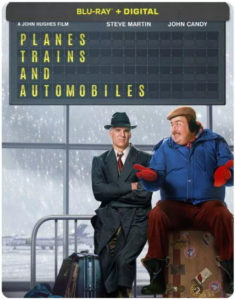
New From Paramount
PLANES, TRAINS & AUTOMOBILES Steelbook Blu-Ray (93 mins., 1987, R; Paramount): John Hughes’ holiday classic returns to the format in a new, collectible Steelbook package, though inside resides the same 2011 Blu-Ray transfer recycled once more, with far too much noise reduction by modern standards.
One of Hughes’ best films (and arguably his finest feature as a director), this teaming of John Candy and Steve Martin (both tremendous) was just a modest box-office performer back in December ’87, when it was out-grossed by the saccharine, cuddly “Three Men and a Baby.” Decades later, “Planes, Trains” is the movie audiences keep coming back to – a spirited holiday travel comedy with a heartwarming ending. It’s a shame Hughes subsequently abandoned making movies for audiences outside of the 13-and-under crowd, since this picture (one of his few R-rated efforts – albeit only for one well-remembered, profanity-laced Martin tirade directed at Edie McClurg) remains a perennial favorite.
Paramount’s old Blu-Ray certainly could be improved with a reduction in DNR and, hopefully, one day will surface as a 4K remaster, but in the meantime, this is all we’ve got. The DTS MA 5.1 soundtrack is more impressive, featuring an eclectic mix of songs and Ira Newborn score, nearly all of which was tossed aside by Hughes in post-production.
For extras, the BD boasts a couple of excellent supplements devoted to Hughes’ career. Presented in HD, “John Hughes: The Voice of a Generation” and “Heartbreak and Triumph: The Legacy of John Hughes” examine his creative process and lasting legacy in an enlightening pair of half-hour programs (included among the interviewees are Hughes collaborators Lauren Shuler Donner, Howard Deutch and Marilyn Vance, plus film alumni Matthew Broderick, Alan Ruck, Jon Cryer and Lea Thompson). A trio of older featurettes (in SD) are mainly comprised of material from the picture’s EPK, along with a three-minute deleted scene (in HD) that was restored to syndicated TV broadcasts of the film (one hopes we’ll eventually see the hours of excised material editor Paul Hirsch discusses in his autobiography, material that Steve Martin has long said contained John Candy’s strongest work).
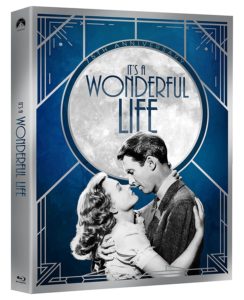 More Yuletide entertainment is on tap with with Paramount’s 75th Anniversary Edition of IT’S A WONDERFUL LIFE (130 mins., 1946). This two-disc set includes both the restored B&W and Colorized versions of the Frank Capra holiday classic on Blu-Ray, along with recipe cards from the “It’s a Wonderful Life: The Official Bailey Family Cookbook.” For a disc-specific review, check the Aisle Seat Archives page. More Yuletide entertainment is on tap with with Paramount’s 75th Anniversary Edition of IT’S A WONDERFUL LIFE (130 mins., 1946). This two-disc set includes both the restored B&W and Colorized versions of the Frank Capra holiday classic on Blu-Ray, along with recipe cards from the “It’s a Wonderful Life: The Official Bailey Family Cookbook.” For a disc-specific review, check the Aisle Seat Archives page.
Superb transfers are on-hand in a pair of long-overdue Blu-Rays of Warren Beatty box-office hits. Beatty’s HEAVEN CAN WAIT (101 mins., 1978, PG) was Beatty and Elaine May’s reworking of the ’40s hit “Here Comes Mr. Jordan,” with Beatty playing a pro football QB who dies en route to the Super Bowl, and is brought back to Earthly terms in the body of a millionaire industrialist. Julie Christie, James Mason, Charles Grodin, Dyan Cannon and Buck Henry – credited with co-directing the film with Beatty – co-star in one of 1978’s biggest theatrical attractions, here presented in a satisfying albeit no-frills Blu-Ray (1.85, Dolby TrueHD mono) from Paramount along with a Digital HD copy…Beatty followed the success of “Heaven Can Wait” with REDS (195 mins., 1981, PG), his sprawling look at the romance between journalists John Reed (Beatty) and Louise Bryant (Diane Keaton) as they chronicle the turbulent turn of the 20th century, the Bolshevik Revolution and WWI. Beatty’s expensive film is gorgeously shot by Vittorio Storaro and backed with an outstanding supporting cast (Edward Herrmann, Jack Nicholson, Paul Sorvino, an uncredited Gene Hackman) plus music from Stephen Sondheim and Dave Grusin. "Reds" has a freshly remastered Blu-Ray out this week with a new 1080p (1.85) transfer and 5.1 Dolby TrueHD sound (plus its original mono soundtrack) along with a digital code and "legacy" supplements from the previous HD-DVD/Blu-Ray.
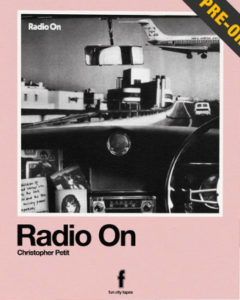 New From Fun City Editions New From Fun City Editions
RADIO ON Blu-Ray (104 mins., 1979; Fun City Editions): With his brother having committed suicide, London DJ Robert (David Bearnes) takes a trip to Bristol to find answers – while encountering a number of assorted characters who provide narrative, and musical, detours along the way. It’s a simple premise but one rendered in striking black-and-white terms that represent the stylistic touches of its producer – Wim Wenders – as much as it does its director, first-time helmer Christopher Petit. Robert’s journey is punctuated by ample music that matches the mood of a pre-Thatcher England, backed by striking imagery of the country in a time of societal change, with tracks supplied by David Bowie, Devo, and Sting, who also appears in this cult film which oozes atmosphere and transports you to a specific time and place.
Fun City Editions’ Blu-Ray includes a new 4K restoration (1.85) from the 35mm original camera negative and enriches the visuals with an impressive array of extras. These include both a new filmed conversation with Christopher Petit along with an audio conversation with the director. Historian/filmmaker Kier-La Janisse also provides a new audio commentary while Petit’s follow-up “digital essay” “Radio On (remix”) is also included, along with an image gallery, the trailer, and extensive booklet notes with essays from Glenn Kenny, Rudy Wurlitzer and Petit himself.
THE SPORE DVD (92 mins., 2021, R; Lionsgate): Independent horror outing is set in a near future after a plague wipes out most of mankind, all thanks to global warming (of course). From there, a girl holes up in an abandoned cabin – or is it – as various survivors get wiped out, one by one, by the fungus. Pretty standard stuff from writer-director D.M. Cunningham, now on disc from Lionsgate (16:9, 5.1). The DVD also includes a commentary and featurette.
Yuletide Offerings from Lionsgate this month, premiering on DVD, include A GIFT FROM BOB (92 mins., 2021, Not Rated), a sequel to “A Street Cat Named Bob,” James Bowen’s own story of his turnaround from homelessness and drug addiction with the help of a savvy feline named Bob. This sequel, helmed by Charles Martin Smith, continues Bob and James’ (a returning Luke Tredaway) story with positive messages and heartfelt good cheer for the whole family. This Twickenham Studios production debuts on DVD in the US from Lionsgate featuring a 16:9 (2.39) transfer and 5.1 sound…Brande Roderick and Steven Chase star in ACE AND THE CHRISTMAS MIRACLE (92 mins., 2021, PG), a offbeat holiday comedy with the “Baywatch” alum playing a single mom who hires an affable con man (Chase) to kidnap her brother’s horse (voice provided by Jon Lovitz). Shenanigans ensue in this family-friendly affair on DVD with a 16:9 transfer (1.78) and 5.1 Dolby Digital audio.
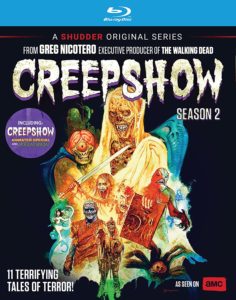 Acorn New Releases Acorn New Releases
CREEPSHOW: Season 2 Blu-Ray (4 hours, 2020; RLJE Films): More E.C. Comics-inspired mayhem is on-tap in this second season of the Shudder-produced cable series featuring an assortment of stars – many familiar genre vets – encountering supernatural mayhem, including C. Thomas Howell, Ted Raimi, Molly Ringwald, Ali Larter, Ashley Laurence, Denise Crosby, Kiefer Sutherland, Barbara Crampton, Breckin Meyer and Kevin Dillon among others. RLJE’s Blu-Ray includes a “Creepshow Holiday Special” and separate animated special; behind-the-scenes raw footage and featurettes; a comic art booklet; photo gallery; 1080p transfers and 5.1 DTS MA soundtracks…More horrific fun is on-tap in Season 2 of ELI ROTH’S HISTORY OF HORROR (4 hours, 2021), the genre auteur’s survey that here encompasses “House of Hell,” “Monsters,” “Witches,” and “Chilling Children,” with interviewees including Stephen King, Quentin Tarantino, Bill Hader, Nancy Allen, Rob Zombie and Slash among others. Additional featurettes, 2.0 DTS MA sound and 1080p (1.78) transfers adorn RLJE’s currently-available Blu-Ray.
KEVIN CAN GO F—K HIMSELF Season 1 Blu-Ray (6 hours, 2021; AMC Studios/RLJE): “Schitt’s Creek” alumnus Annie Murphy receives her own breakout series with “Kevin Can Go F—k Himself,” a dark comedy wherein literal “sitcom wife” Allison Roberts escapes her conventional confines and heads out with her neighbor on a journey that shifts from laugh-track laden comedy to single-camera drama. This is an ambitious series from producer/creator Valerie Armstrong that doesn’t always hit the mark, but manages to remain a compelling view throughout its eight episodes thanks to its intriguing concept and Murphy’s performance anchoring all aspects of the material. Three featurettes are on-tap along with 1080p (1.78) transfers and 5.1 DTS MA soundtracks.
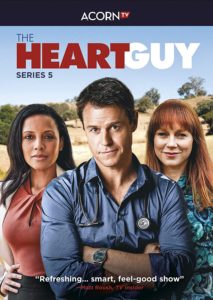 Also New on Blu-Ray From Acorn: Guy Pearce returns in Season 3 of JACK IRISH (229 mins., 2021), the Aussie noir that picks up Jack’s life three years after its second season. Irish is now working as a lawyer and father who’s lost touch with his old crew, at least before an old ally returns, seeking help to uncover the culprit behind the death of an off-duty police officer. This well-reviewed import is back on Blu-Ray here with four episodes on two discs (1080p, 2.0 DTS MA) from RLJE…Series 2 of MS. FISHER’S MODERN MURDER MYSTERIES (381 mins., 2021) again spotlights the delightful Geraldwine Hakewill as a PI working out of the Melbourne Adventuresses’ Club with help from ex-spy Birdie Birnside (Catherine McClements) and Violetta Fellini (Louisa Mignone). Joel Jackson’s James Steed is, of course, also along for the ride in this ’60s set spin-off of the original Phryne Fisher adventures, with RLJE’s Blu-Ray boasting eight episodes on two discs (1080p, 2.0 DTS MA) Also New on Blu-Ray From Acorn: Guy Pearce returns in Season 3 of JACK IRISH (229 mins., 2021), the Aussie noir that picks up Jack’s life three years after its second season. Irish is now working as a lawyer and father who’s lost touch with his old crew, at least before an old ally returns, seeking help to uncover the culprit behind the death of an off-duty police officer. This well-reviewed import is back on Blu-Ray here with four episodes on two discs (1080p, 2.0 DTS MA) from RLJE…Series 2 of MS. FISHER’S MODERN MURDER MYSTERIES (381 mins., 2021) again spotlights the delightful Geraldwine Hakewill as a PI working out of the Melbourne Adventuresses’ Club with help from ex-spy Birdie Birnside (Catherine McClements) and Violetta Fellini (Louisa Mignone). Joel Jackson’s James Steed is, of course, also along for the ride in this ’60s set spin-off of the original Phryne Fisher adventures, with RLJE’s Blu-Ray boasting eight episodes on two discs (1080p, 2.0 DTS MA)
On DVD from RLJE and Acorn: Julie Wassmer’s popular novels featuring WHITSTABLE PEARL (298 mins., 2021) have been newly adapted in this Acorn series. Kerry Godliman plays a single mom who starts up her own PI agency in the small seaside town of Whitstable. Mysteries and character-driven drama intertwine in this first season of the show, presented on two DVDs featuring all six episodes (16:9, 2.0). A 38-minute “Page to Screen” featurette is the set’s lone supplement…Series 5 of the hit series THE HEART GUY (391 mins., 2021) is now available, with Rodger Corser’s Hugh Knight and his family facing their biggest obstacles ever in the final season of the series. All eight episodes are included on two discs (16:9, 2.0 stereo)….The Sundance Now series THE DROWNING (187 mins., 2021) chronicles the efforts of Jodie Walsh after her son vanishes from a lakeside picnic. Years later she meets a boy who she firmly believes is him, only to have others convinced that she’s wrong, in this absorbing series with a strong performance from Jill Halfpenny. RLJE’s DVD includes a 16:9 transfer, 2.0 audio and a very brief featurette.
Two “Halloween Pop-Up Collectible” DVD releases are new from Acorn and RLJE for the hit series MIDSOMER MURDERS and MURDOCH MYSTERIES. These Limited Edition releases include collectible pop-up packaging for the MIDSOMER episode “The Magician’s Nephew” (with commentary by John Nettles and Jane Wymark), plus a two-episode MURDOCH set featuring “Sir, Sir? Sir!!!” and “Murdoch and the Cursed Caves” (both DVDs 16:9 and 2.0)…A HOUSE DIVIDED Season 3 (5 hours, 2020) continues to follow the Sanders family as they navigate chaos and turmoil as their empire falls apart around them (16:9, 2.0 Dolby Digital).
GHOSTBUSTERS AFTERLIFE (**, PG-13): Hollywood’s latest corporate IP revival also tries to tap into the nostalgia for the 1984 “Ghostbusters” t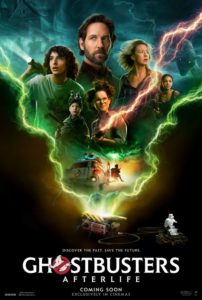 hat Columbia’s female-cast 2016 “not a remake/sequel” mostly missed. Hiring original director Ivan Reitman’s son, Jason, as director/co-writer starts off the goodwill that this belated sequel tries to keep going by way of a story that revolves around the late Egon Spengler, Harold Ramis’ character, and how he left the big city for rural flyover country – all the better to keep the spirits at bay. hat Columbia’s female-cast 2016 “not a remake/sequel” mostly missed. Hiring original director Ivan Reitman’s son, Jason, as director/co-writer starts off the goodwill that this belated sequel tries to keep going by way of a story that revolves around the late Egon Spengler, Harold Ramis’ character, and how he left the big city for rural flyover country – all the better to keep the spirits at bay.
The latter include Gozer and other returning beasties who appear to haunt his family – including estranged daughter Carrie Coon and her kids Finn Wolfhard (the charisma-free lead from “Stranger Things”) and the quite excellent Mckenna Grace, who inherit Egon’s weirdo farm and try to piece together what to do with all the old Ghostbusters equipment and why the original group fell out with one another in the process.
“Afterlife”’s script may have read OK on paper but the final result manages to be two things: first, it’s a passable “family movie” for those of us with kids, but secondly – and for everyone else – it’s a bizarre reworking of its 1984 predecessor that’s shockingly bereft of humor and energy. The younger Reitman may have had his heart in the right place – stocking the film with the same dramatic beats as the original, Elmer Bernstein’s themes from the ’84 movie, and expected last-minute cameos – but his streak of busted, post-”Juno” movies continues with a picture that seems to be so preoccupied with its characters and their respective stories that it forgets to be thrilling, scary, or magical. There’s the science-crazy Grace, trying to connect with Egon himself; the older brother trying to impress a girl at his new drive-in job; their mother, whom Egon never knew, hoping to make a fresh start; the town science teacher (Paul Rudd), who wants to woo her; Grace’s new pal Podcast, who the movie tries to fashion as a diminutive Dan Aykroyd; the town sheriff (Wokeem Woodbine), who disappears after a single scene; plus late appearances by villainous Gozer and Ivo Shandor (J.K. Simmons), the original ‘Busters, and a CGI recreation of Egon himself that’s on-screen so much that it verges on bad taste (or perhaps crosses that line, depending on your point of view).
With all of this happening, Reitman and co-writer Gil Kenan attempt to adhere to the main dramatic structure of the 1984 movie, but there’s one problem: the failure of the 2016 movie led Sony to cut this film’s budget to roughly half that of its predecessor. That resulted in rural Canadian shooting locales and a notable reduction in special effects – a major problem because there’s just not enough ghosts or bustin’ going on here. The gang meets a Slimer-like creature named Muncher, but one set-piece involving the apparition aside, the picture is just curiously light on the supernatural build-up to the drama, preferring instead to go along with the family’s story…and playing ultimately like something Reitman, whose own work has been playing to diminishing returns for years, was more interested in than making a comic fantasy.
Subsequently, “Afterlife” misses a sense of playfulness and humor – the kind the elder Reitman was so expert at cultivating during his heyday. Only Rudd brings an infusion of comedic energy to his part with the actor’s typical aplomb, with much of this movie lacking wit and levity – even a typical episode of “Stranger Things” has far more laughs than this film. And how in the world with an audience favoring the younger set did Reitman and Kenan not repurpose the iconic “he slimed me!” sequence from the 1984 movie?
“Ghostbusters: Afterlife” still isn’t the worst reycling Hollywood has given us of late, if only because the people who made it did, at least, seem to care. Unfortunately, they’re not as capable in terms of being creative talents as their predecessors, leaving us with another curiously flat remake whose best moments we’ve all seen before.
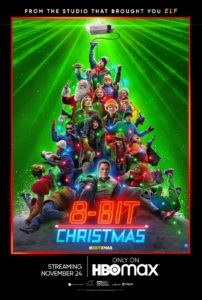 8-BIT CHRISTMAS (**½, PG, HBO Max): In the old days (pre-2020), you’d usually run out to a movie and see your friends the day before Thanksgiving — now you log into one of a myriad of streaming services and find out “hey, that ‘thing’ is now available, let’s check it out.” While I tend to give these “service originals” 10 minutes before turning them off, 8-BIT CHRISTMAS isn’t at all bad — this HBO Max/New Line Cinema original is an adaptation of Kevin Jakubowski’s book about growing up in the ’80s and the author’s presumed grade-school alter-ego conspiring with his friends to find a Nintendo Entertainment System by any means possible. 8-BIT CHRISTMAS (**½, PG, HBO Max): In the old days (pre-2020), you’d usually run out to a movie and see your friends the day before Thanksgiving — now you log into one of a myriad of streaming services and find out “hey, that ‘thing’ is now available, let’s check it out.” While I tend to give these “service originals” 10 minutes before turning them off, 8-BIT CHRISTMAS isn’t at all bad — this HBO Max/New Line Cinema original is an adaptation of Kevin Jakubowski’s book about growing up in the ’80s and the author’s presumed grade-school alter-ego conspiring with his friends to find a Nintendo Entertainment System by any means possible.
This movie, though, actually isn’t awash in nostalgia as you might expect. The movie completely understands the nature of what the NES meant to kids back in the era, but does a nice job integrating it into a timeless, family-oriented story that has a really sincere, moving payoff. Neil Patrick Harris reminds you what a fine serious actor he can be as he narrates the film and appears in bookending sequences as the older version of our protagonist, and Steve Zahn is also solid as the boy’s father. The kids are mostly likeable and the film moves at a good clip, and is enhanced by a pleasant score by Joseph Trapanese.
8 BIT CHRISTMAS does seem a little too generic and “smooth” for its own good — whether it’s because of the COVID-era shooting in Toronto, the movie has a processed, digital sheen that doesn’t feel “lived in.” Jakubowski’s own screenplay also mimics Jean Shepherd’s A CHRISTMAS STORY a little too much for its own good also, incorporating the same rhythms in the narration and types of episodic happenings that marked that (far) superior Christmas classic.
Still, even if it ends up being little more than a decent, PG-rated Hallmark movie, 8-BIT CHRISTMAS is easy-going viewing for the holidays, and compared to most of what’s out there, it’s worth a click or two.
NEXT TIME: More of the latest releases! Until then, don’t forget to drop in on the official Aisle Seat Message Boards and direct any emails to our email address. Cheers everyone!
|

 More Yuletide entertainment is on tap with with Paramount’s 75th Anniversary Edition of IT’S A WONDERFUL LIFE (130 mins., 1946). This two-disc set includes both the restored B&W and Colorized versions of the Frank Capra holiday classic on Blu-Ray, along with recipe cards from the “It’s a Wonderful Life: The Official Bailey Family Cookbook.” For a disc-specific review, check the Aisle Seat Archives page.
More Yuletide entertainment is on tap with with Paramount’s 75th Anniversary Edition of IT’S A WONDERFUL LIFE (130 mins., 1946). This two-disc set includes both the restored B&W and Colorized versions of the Frank Capra holiday classic on Blu-Ray, along with recipe cards from the “It’s a Wonderful Life: The Official Bailey Family Cookbook.” For a disc-specific review, check the Aisle Seat Archives page. New From Fun City Editions
New From Fun City Editions Acorn New Releases
Acorn New Releases Also New on Blu-Ray From Acorn: Guy Pearce returns in Season 3 of JACK IRISH (229 mins., 2021), the Aussie noir that picks up Jack’s life three years after its second season. Irish is now working as a lawyer and father who’s lost touch with his old crew, at least before an old ally returns, seeking help to uncover the culprit behind the death of an off-duty police officer. This well-reviewed import is back on Blu-Ray here with four episodes on two discs (1080p, 2.0 DTS MA) from RLJE…Series 2 of MS. FISHER’S MODERN MURDER MYSTERIES (381 mins., 2021) again spotlights the delightful Geraldwine Hakewill as a PI working out of the Melbourne Adventuresses’ Club with help from ex-spy Birdie Birnside (Catherine McClements) and Violetta Fellini (Louisa Mignone). Joel Jackson’s James Steed is, of course, also along for the ride in this ’60s set spin-off of the original Phryne Fisher adventures, with RLJE’s Blu-Ray boasting eight episodes on two discs (1080p, 2.0 DTS MA)
Also New on Blu-Ray From Acorn: Guy Pearce returns in Season 3 of JACK IRISH (229 mins., 2021), the Aussie noir that picks up Jack’s life three years after its second season. Irish is now working as a lawyer and father who’s lost touch with his old crew, at least before an old ally returns, seeking help to uncover the culprit behind the death of an off-duty police officer. This well-reviewed import is back on Blu-Ray here with four episodes on two discs (1080p, 2.0 DTS MA) from RLJE…Series 2 of MS. FISHER’S MODERN MURDER MYSTERIES (381 mins., 2021) again spotlights the delightful Geraldwine Hakewill as a PI working out of the Melbourne Adventuresses’ Club with help from ex-spy Birdie Birnside (Catherine McClements) and Violetta Fellini (Louisa Mignone). Joel Jackson’s James Steed is, of course, also along for the ride in this ’60s set spin-off of the original Phryne Fisher adventures, with RLJE’s Blu-Ray boasting eight episodes on two discs (1080p, 2.0 DTS MA) hat Columbia’s female-cast 2016 “not a remake/sequel” mostly missed. Hiring original director Ivan Reitman’s son, Jason, as director/co-writer starts off the goodwill that this belated sequel tries to keep going by way of a story that revolves around the late Egon Spengler, Harold Ramis’ character, and how he left the big city for rural flyover country – all the better to keep the spirits at bay.
hat Columbia’s female-cast 2016 “not a remake/sequel” mostly missed. Hiring original director Ivan Reitman’s son, Jason, as director/co-writer starts off the goodwill that this belated sequel tries to keep going by way of a story that revolves around the late Egon Spengler, Harold Ramis’ character, and how he left the big city for rural flyover country – all the better to keep the spirits at bay.












 Brooke Adams co-stars and plays well off Sutherland, with an ace supporting trio of genre faves – Nimoy, Jeff Goldblum and Veronica Cartwright – making for a film that’s compelling and eerie, thanks to Kaufman and writer W.D. Richter’s often subtle touches, not to mention Michael Chapman’s cinematography and Denny Zeitlin’s excellent score. Nimoy in particular is a standout, playing a psychologist who’s one of the first to succumb to the invasion, in a character so intentionally flat it’s impossible for our protagonists to tell the difference between the real shrink and the pod version that replaces him.
Brooke Adams co-stars and plays well off Sutherland, with an ace supporting trio of genre faves – Nimoy, Jeff Goldblum and Veronica Cartwright – making for a film that’s compelling and eerie, thanks to Kaufman and writer W.D. Richter’s often subtle touches, not to mention Michael Chapman’s cinematography and Denny Zeitlin’s excellent score. Nimoy in particular is a standout, playing a psychologist who’s one of the first to succumb to the invasion, in a character so intentionally flat it’s impossible for our protagonists to tell the difference between the real shrink and the pod version that replaces him. Genre fans – especially aficionados of ’70s TV – should also be very excited by the newly remastered 2K scans of
Genre fans – especially aficionados of ’70s TV – should also be very excited by the newly remastered 2K scans of  Heston Blu-Ray Debuts
Heston Blu-Ray Debuts More satisfying, though hampered by a set-bound studio shoot, is Heston’s 1967 film
More satisfying, though hampered by a set-bound studio shoot, is Heston’s 1967 film  Bronson, Peppard & Other ’70s Sojourns
Bronson, Peppard & Other ’70s Sojourns Far more entertaining is
Far more entertaining is  An earlier ’70s western with more of a lighter touch is
An earlier ’70s western with more of a lighter touch is Conti provides a seven-minute, diplomatic overview of his work on the film in Scorpion’s Blu-Ray premiere of this little-seen late ’70s drama, which Avildsen decided to make shortly after being fired from the John Travolta smash “Saturday Night Fever” (talk about a comedown!). The 2K scan (1.78) and mono sound are both top-notch, with Scorpion and Kino Lorber also offering a even briefer interview with co-star Nicolas Coster.
Conti provides a seven-minute, diplomatic overview of his work on the film in Scorpion’s Blu-Ray premiere of this little-seen late ’70s drama, which Avildsen decided to make shortly after being fired from the John Travolta smash “Saturday Night Fever” (talk about a comedown!). The 2K scan (1.78) and mono sound are both top-notch, with Scorpion and Kino Lorber also offering a even briefer interview with co-star Nicolas Coster. The segments that remain still carry some curiosity value due to their stars – “Animal House” almunus Peter Riegert fares best (relatively speaking) in the opening segment as a me-generation yuppie who wants to “grow” beyond the confines of his suburban family. This is a lightly amusing slice of comedic irony from director Bob Giraldi that co-stars Candy Clark, Diane Lane and a topless Teresa Ganzel, and is by far the most palatable of the segments. “Jaws 2” ingenue Ann Dusenberry subsequently tries hard to sell her rags-to-riches story of a stripper who becomes the head of Robert Culp’s margarine empire in a piece that overstays its welcome – yet even that is more amusing than director Henry Jaglom’s strained satire of police procedurals that closes the picture, featuring Richard Widmark and Robby Benson as cops hunting after Christopher Lloyd’s serial killer.
The segments that remain still carry some curiosity value due to their stars – “Animal House” almunus Peter Riegert fares best (relatively speaking) in the opening segment as a me-generation yuppie who wants to “grow” beyond the confines of his suburban family. This is a lightly amusing slice of comedic irony from director Bob Giraldi that co-stars Candy Clark, Diane Lane and a topless Teresa Ganzel, and is by far the most palatable of the segments. “Jaws 2” ingenue Ann Dusenberry subsequently tries hard to sell her rags-to-riches story of a stripper who becomes the head of Robert Culp’s margarine empire in a piece that overstays its welcome – yet even that is more amusing than director Henry Jaglom’s strained satire of police procedurals that closes the picture, featuring Richard Widmark and Robby Benson as cops hunting after Christopher Lloyd’s serial killer. Also new from Code Red this month is
Also new from Code Red this month is TO HELL AND BACK Blu-Ray (106 mins., 1955; Not Rated):
TO HELL AND BACK Blu-Ray (106 mins., 1955; Not Rated): A reportedly sizable budget backed
A reportedly sizable budget backed  Rathbone’s co-star in 1942’s “The Spider Woman” – regarded as one of the better late entries in the star’s Sherlock Holmes series – was Gale Sondergaard, whose popularity lead to the one-time spin-off feature
Rathbone’s co-star in 1942’s “The Spider Woman” – regarded as one of the better late entries in the star’s Sherlock Holmes series – was Gale Sondergaard, whose popularity lead to the one-time spin-off feature Edward G. Robinson plays a vaudeville mentalist who actually has the power to see the future, and after retreating from public view, returns to help an heiress (Gail Russell) and her fiance (John Lund) in
Edward G. Robinson plays a vaudeville mentalist who actually has the power to see the future, and after retreating from public view, returns to help an heiress (Gail Russell) and her fiance (John Lund) in  W.C. Fields Comedies: A trio of vintage W.C. Fields comedies are also new to high definition this month from Kino Lorber, all licensed through Universal.
W.C. Fields Comedies: A trio of vintage W.C. Fields comedies are also new to high definition this month from Kino Lorber, all licensed through Universal. HOMEBODIES Blu-Ray (96 mins., 1974, PG):
HOMEBODIES Blu-Ray (96 mins., 1974, PG): Bill Morrison’s newest film excursion,
Bill Morrison’s newest film excursion,  8-BIT CHRISTMAS (**
8-BIT CHRISTMAS (**
